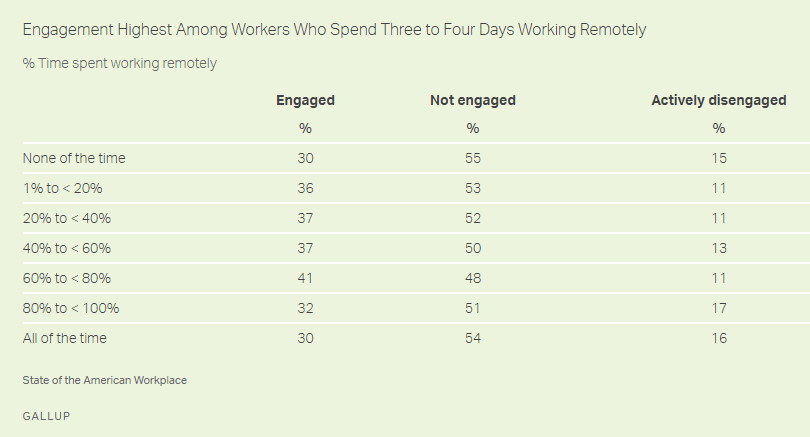In today’s rapidly evolving business landscape, one of the most pressing challenges for employers is retaining their workforce. A key solution to this is employee engagement. As Forbes defines it, employee engagement is the emotional commitment an employee has to the organization and its goals. This emotional commitment is not just a buzzword; it’s a crucial factor that can make or break your business.
The Mind the Workplace report, a comprehensive survey of over 17,000 American employees, revealed some staggering statistics. 71% of the participants actively sought new job opportunities or contemplated leaving their current roles. This is a wake-up call for leaders, highlighting the urgent need to drive engagement in an increasingly diverse and demanding workforce.
Why Is Employee Engagement Important?
Is there any reason to keep your employees engaged? Of course there is!
Understanding the cost of disengagement can be a powerful motivator for change. According to the CHRC, disengaged workers are costing the North American business economy a staggering $350 billion annually in lost productivity. This is a significant figure that underscores the urgency of addressing employee engagement in your organization.
However, with high employee engagement, the workplace atmosphere becomes positive, actions become dependable, and internal conflicts barely exist. This boosts productivity and fosters a sense of motivation and inspiration among your workforce.
Workers who buy into the company message and work together as a team strive to lead your business to a successful outcome. 69% of employees say they would work harder if they felt their efforts were better recognized. With a great environment, absenteeism should decrease, as should employees arriving late. It will drive growth and increase employee retention.
What can I do to Increase Employee Engagement?
Positive Employee Feedback
As a manager, your role in fostering employee engagement is pivotal. Instead of focusing on faults, identify what excites each employee and highlight their strengths. This simple act of positive feedback can significantly impact their engagement levels. Remember, even the smallest compliment can make your employee’s day. Workers are 30x more actively engaged when managers focus on their strengths, underscoring the importance of your role in this process.
This isn’t to say you shouldn’t let employees know when they aren’t performing to the expected standard. However, the way you communicate with your employees is crucial. This will not only help with engagement but can also increase revenue. In a long-term study, companies with the best corporate cultures and highly appreciated their employees, customers, and owners grew revenue by 682%.
Give Employees Autonomy
Are you constantly breathing down your employee’s necks?
Micromanaging your employees can decrease productivity and cause them to lose autonomy. However, by providing opportunities for your employees to build their confidence and demonstrate their ability to do their work, you can foster a sense of growth and development. This can significantly boost their engagement and morale, inspiring them to strive for more.
Employees who are empowered to explore their passions display more engagement. Offering encouragement and support for their work can also raise your team’s morale.
Empowering employees with autonomy, such as flexible scheduling, can dramatically improve their engagement. This shows that you trust them and gives them control over their work-life balance. Gallup discovered that engagement climbs when employees spend some time working remotely and some time working in a location with their coworkers, highlighting the importance of autonomy in fostering engagement.

Strong Communication
Strong, positive communication between you and your employees is crucial. Employees always feel more engaged when they are informed about company events. Without strong communication, there may be a disconnect, which can cause mistakes and problems to occur more frequently.
Encourage teamwork and help your employees bond with each other. When a team is powered by solid communication, employees feel more confident, cooperative, and optimistic in their workplace.
Encourage Employee Feedback
Providing your employees with opportunities to give feedback about management is not just about improving processes, it’s about making them feel heard and included. This can help managers grow and learn how to better themselves, and it also gives your employees a voice that leads to change. This sense of inclusion and empowerment can significantly boost their engagement and morale.
They can feel empowered that they, too, can change something inside the company, even though it might be inconsequential in the big picture. Suppose employees know management is willing to listen to their ideas and change. In that case, employee engagement rates will be higher, and morale will be increased.
Know Your Employees Personally
It may seem obvious to some, but taking the time to know each of your employees on a personal level can make them feel deeply valued and appreciated. This can help them feel less like a cog in the big company machine and more like integral and valued staff members, fostering a stronger sense of engagement and commitment.
Even small things, such as saying hello to them in the hallway or asking about their family or hobbies, can go a long way. Doing this can help your employees feel like you care about them. If employees feel valued as people, they are much more likely to be engaged in their work.
Support your Employees

A huge part of keeping employees engaged is showing them you support them. There are countless ways to show empathy and support to your team, and sometimes, the most effective way is to remind them frequently that you are there for them.
Some managers see benefits from scheduling regular 1:1 meetings with employees, allowing employees to voice their concerns, mention blockers, and highlight any areas they are struggling with. It is vital to allow employees to be open about their struggles and ensure that they are met with empathy when they do so. Nothing is more discouraging than a manager diminishing your struggles and failing to support you.
Give Your Employees a Position of Influence
Some employees love responsibility. If you put them in a position of influence, you can see how they will react to the new role. Acknowledging that some employees are engaging and then putting them to the test can help you find new leaders in your company. If you allow employees to learn, thrive, and discover what they excel at, they will be more engaged.
Employees flourish when they feel trusted to make independent decisions that impact those around them. The most engaged employees will become the people managers trust to deliver whenever things go haywire. Employees are the most engaged when they feel a sense of responsibility towards their leaders and when their actions set an example for other employees around them.
Engaging employees is challenging. The workplace can be tedious, but with the right people and atmosphere, it can become a place where people are motivated and happy to work. Nowadays, leaders need to have high emotional intelligence to navigate the sea of employees’ emotions and well-being.
Leaders must constantly innovate to find ways to increase employee engagement at work. A couple of minor changes here and there can help improve your team’s overall corporate culture. With more employee engagement, your staff members will be more motivated to work toward their goals while furthering your company’s objectives. Employee engagement is not only essential but crucial to a successful workplace.
How Celayix Nurtures Employee Engagement
Inspired by isolved’s recent HR leaders report, we wanted to share how Celayix embodies the values that help close the employer-employee divide and deliver meaningful employee experiences.
At Celayix, we don’t just talk about employee engagement; we live it. Our approach is grounded in research, but it’s also profoundly human. Here’s how we strive to be champions of change:
Informed Insights:
- We’re not flying blind. We’ve studied isolved’s HR leaders report—the ultimate guidebook for us.
- Armed with data and best practices, we tailor our strategies to fit our unique context.
Empowering Autonomy:
- Imagine a workplace where everyone’s voice matters.
- At Celayix, we empower our team to shape their work, fostering creativity and ownership.
Ownership and Accountability:
- It’s not about finger-pointing; it’s about shared responsibility.
- When employees feel a sense of ownership, they go the extra mile.
Flexibility in the New Normal:
- Remote work? Hybrid models? We’ve got it covered.
- Our team chooses where they thrive—whether it’s their home office or our cozy workspace.
Fun Fridays:
- Work hard, play harder. That’s our motto.
- Fridays are for team bonding, virtual games, and laughter. Because engaged teams are happy teams.
Transparent Leadership:
- Our leaders don’t hide behind closed doors.
- They share their vision, struggles, and wins openly.
- Transparency builds trust and fuels our positive culture.
Inclusivity at Heart:
- Diversity isn’t a buzzword; it’s our heartbeat.
- From potluck lunches to celebrating cultural festivals, we embrace everyone.
- Good leaders ensure that no one feels left out.
HR Skills in Action:
- Our leaders wear many hats.
- They’re part manager, part magician.
- Leveraging tech and empathy, they pave the way for smooth employee journeys.
So, when we say we’re champions of change, we mean it. Employee engagement isn’t a checkbox; it’s our daily mission.
Our Goal: Leading in Workforce Management
We deeply understand workforce management challenges and solutions as an employee scheduling software company. It would be ironic if we didn’t apply these insights to ensure our employees have great experiences and growth opportunities.
The isolved report highlights that remote work expectations are crucial in talent acquisition. At Celayix, we offer our team the flexibility to choose their workplace and schedule, promoting a healthy work-life balance. This flexibility, our Fun Friday events, and the active Microsoft Teams channel keep engagement high.
Great Leaders Create Thought Leaders
Good leadership involves more than checking off tasks; it’s about embodying company values and supporting team members. Transparency, inclusivity, and employee autonomy are essential. At Celayix, leaders know their team personally and encourage open communication. They actively seek and implement employee suggestions to improve the workplace culture and experience.
Fostering inclusivity is crucial, whether through team activities, shared meals, or everyday interactions. Influential leaders leverage technology and business acumen to support each employee’s journey, aiming to minimize challenges.
Insights from Our Leader and Founder, Gurmit Dhaliwal
Our founder, Gurmit Dhaliwal, shares his approach to leadership:
I use a couple of different styles…primarily transformational leadership, which focuses on anticipating change and preparing the team for it. I also incorporate servant leadership, encouraging involvement from everyone in decision-making. I make a point to interact with everyone and stay connected with all departments. My leadership style is approachable—I’m not the type to stay behind closed doors and avoid interactions.
This blend of leadership styles demonstrates Gurmit’s thoughtful approach, creating a path of thought leadership that resonates throughout Celayix. His commitment to being approachable and involved ensures that every team member feels valued and heard.
Conclusion
Employee engagement is not just a buzzword; it’s the cornerstone of a thriving workplace. As we’ve explored, engaged employees are more productive, motivated, and committed to their organization’s success. They bring energy, creativity, and a collaborative spirit that can transform a company’s culture and drive long-term growth.
At Celayix, we recognize the importance of fostering a supportive, inclusive, and empowering work environment. By implementing strategies such as providing positive feedback, granting autonomy, maintaining strong communication, and encouraging employee feedback, we nurture a culture where every team member feels valued and engaged. Our flexible work options and commitment to transparency further reinforce our dedication to our employees’ well-being.
By embracing these principles, organizations can create a positive and dynamic workplace where employees are retained and inspired to excel. In the end, investing in employee engagement is an investment in any business’s future success and sustainability.






